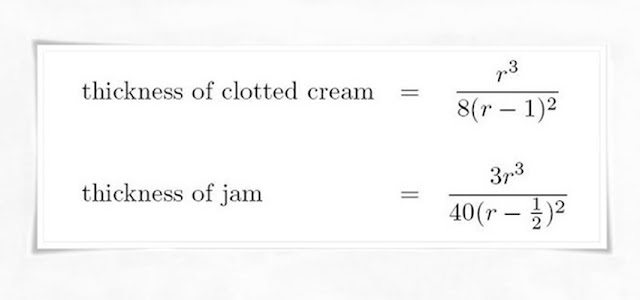We recently popped over into Devon. As we crossed the Tamar bridge from Cornwall, where we live, it occurred to me how narrow a gap it is for there to such a large difference in the preparation of Cream Teas.
The importance of this matter was made clear to me the other
day, National Cream Tea Day as it happens, when I mentioned on Twitter why jam first is
the correct way to prepare a cream tea. This prompted a truly
impressive (to me) amount of interest so I thought I’d expand on my information
and reasoning in the hope of making things clearer – especially to people in
Devon!
Devonians, as I understand it, for some pervie reason, apply
their clotted cream to scones before
adding the jam! In Cornwall we do as nature intended; the jam is spread onto
the scone first and then topped with a dollop of clotted cream and I can prove
we are right!
The Correct Way to Prepare a Cream Tea
Dr. Eugenia Cheng, a mathematician at the University of
Sheffield’s School of Mathematics and Statistics did some research on the
subject and came up with the following info:
~ Jam, due to its density, needs to be spread
prior to the application of the clotted cream.
Putting it on after the cream may cause the jam to run off – creating
sticky fingers.
~ The thickness of
the cream should also not be thicker than the scone, as the scone will become
off balance whilst trying to eat it.
~ If r is the radius
of the scone, then we have the following formula for the thickness of the jam and
the thickness of the cream …
Roddas, who make superb Cornish Clotted Cream have simplified these instructions to 2 parts scone, 1 part jam, 1 part cream – which looks just right to me!
The Proper Way to Enjoy Cream Teas
Their final point is …
I do so concur but am sad for Americans (or possibly
everyone not in the UK) – the jars of “clotted cream” available elsewhere are
really no substitute, not at all at all, for the real thing.
So the cream must be clotted, the jam is usually strawberry
but raspberry and blackcurrant are both fine alternatives. Some people,
additionally, butter their scones before adding the jam and cream – presumably
they are on holiday so the calories don’t count. What about the scones?
Genius Scone Recipe
Makes 6-8 normal sized scones or 4 embarrassingly large
ones, the recipe can easily be doubled.
225g/8oz self-raising
flour
OR
225g/8oz plain flour + 1 rounded tsp baking powder (about 8g/a scant ½oz)
a pinch of salt
60g/2½oz cold butter or margarine
25g/1oz caster sugar
100ml/3½ fl oz milk
OR
225g/8oz plain flour + 1 rounded tsp baking powder (about 8g/a scant ½oz)
a pinch of salt
60g/2½oz cold butter or margarine
25g/1oz caster sugar
100ml/3½ fl oz milk
~ Preheat the oven
to 200°C/400°F/180C fan/gas 6.
~ Stir together the flour, salt and baking powder (if using).
~ Add the butter or margarine and “rub in” with your fingers until a breadcrumb texture is achieved (see below).
~ Stir in the sugar once you have finished rubbing in; if you add it earlier it’s uncomfortable on the hands although, of course, it does exfoliate.
~ Add the milk and mix in, by hand is easiest, add a little more milk if too dry or a little more flour if too wet – work just enough to form a soft dough.
~ On a floured surface press or roll the dough out to about 1½cm/½” thick and using a cookie cutter cut into rounds. Or you could cut into squares which are easier and more economical on time: no re-rolling. They look quite good too.
~ Transfer the scones to a greased baking try, brush their tops with a little milk and bake in the oven till risen and golden – about 15 minutes.
~ Transfer to a cooling rack till needed.
~ Stir together the flour, salt and baking powder (if using).
~ Add the butter or margarine and “rub in” with your fingers until a breadcrumb texture is achieved (see below).
~ Stir in the sugar once you have finished rubbing in; if you add it earlier it’s uncomfortable on the hands although, of course, it does exfoliate.
~ Add the milk and mix in, by hand is easiest, add a little more milk if too dry or a little more flour if too wet – work just enough to form a soft dough.
~ On a floured surface press or roll the dough out to about 1½cm/½” thick and using a cookie cutter cut into rounds. Or you could cut into squares which are easier and more economical on time: no re-rolling. They look quite good too.
~ Transfer the scones to a greased baking try, brush their tops with a little milk and bake in the oven till risen and golden – about 15 minutes.
~ Transfer to a cooling rack till needed.
The reason I call this my genius scone recipe is that it not only makes excellent scones but also numerous other wonderful things such as rock cakes, shortcakes, griddle cakes, dumplings, doughnuts, crisp biscuits and lots more.
The recipe is so flexible and useful I have written a whole book about it – The Secret Life of Scones giving every bit of information and idea I can think of to help make delicious scones and their friends and relations.







No comments:
Post a Comment